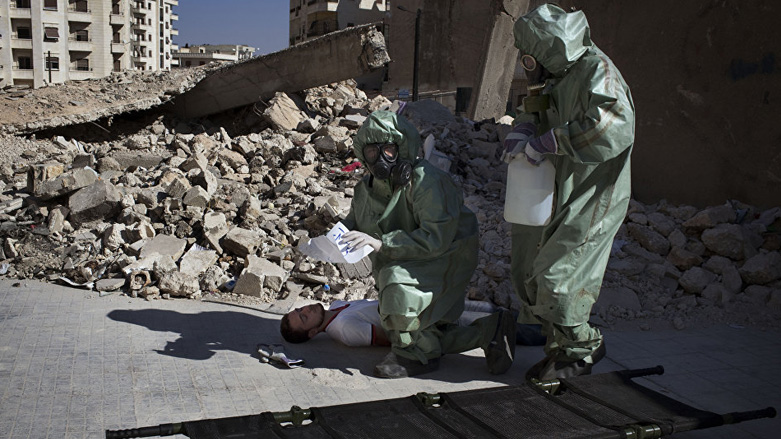US, Russia clash over Syria’s continued use of chemical weapons

WASHINGTON DC, United States (Kurdistan 24) – Despite repeated US warnings to the Syrian regime against using chemical weapons against its own people, Damascus was reported to have used chlorine gas in Idlib province, one of the few remaining areas in the country under rebel control.
The US responded, once again, by denouncing the Syrian regime while calling on Russia to restrain Damascus and help to hold it accountable.
On Sunday, a Syrian helicopter reportedly dropped a barrel bomb containing chlorine gas in the town of Saraqeb. Victims who sought treatment at local hospitals smelled of chlorine, a doctor told the BBC, and they “suffered breathing problems and irritation in their eyes.”
On Monday, State Department Spokesperson Heather Nauert said that the US “is gravely alarmed” by allegations of Syria’s repeated use of chlorine gas.
“This attack is the sixth such reported instance in the past 30 days in Syria,” she stated.
At last month’s founding conference of the “International Partnership against Impunity for use of Chemical Weapons” in Paris, Nauert recalled that Secretary of State Rex Tillerson had said, “Russia ultimately bears responsibility” for the victims of Syria’s chemical assaults.
The UN Security Council met on Monday to discuss the situation in Syria, and the US ambassador, Nikki Haley, asserted that Syria “must immediately stop using all chemical weapons and address the gaps and inconsistencies” in its chemical weapons declaration, as well as “destroy all of its remaining chemical weapons.”
She complained that Russia had blocked a Security Council statement condemning Syria’s use of chemical weapons and that Russia had destroyed the Joint Investigative Mechanism, a cooperative effort between the Security Council and the Organization for the Prohibition of Chemical Weapons (OPCW), established in 2015 to investigate alleged instances of Syrian use of chemical weapons.
Russia’s UN Ambassador, Vassily Nebenzia, responded by denouncing her statements as “slander against Russia.”
In January, Russia proposed a new means to investigate any future allegations of Syrian use of chemical weapons. However, Haley charged that Moscow’s proposed mechanism would be subject to political manipulation.
“Russia wants to be able to cherry pick the investigators,” she said. “And it wants the Security Council to be able to review all of the findings of this investigation and decide what makes it into the final report.”
There is a major precedent for such Russian action, and it involved Iraq under Saddam Hussein.
Following the 1991 Gulf War, the UN Special Commission (UNSCOM) was established to supervise the destruction of those elements of Saddam’s proscribed weapons programs (nuclear, biological, chemical, and missile) that survived the US bombing campaign during the war.
UNSCOM’s work was considered rigorous and thorough, but lack of cooperation from Baghdad caused it to drag on for years. Then, in late 1997, with major questions still remaining about all of Iraq’s weapons programs, Saddam initiated a series of crises that had the effect of ending UNSCOM’s presence in Iraq a year later.
Russia supported Iraq then, as it supports Syria today, and UNSCOM never returned to Iraq. Instead, Moscow succeeded in winning approval for a much weaker inspection mechanism: United Nations Monitoring, Verification and Inspection Commission (UNMOVIC), which was created in 1999.
UNMOVIC was much weaker than UNSCOM. For three years, its staff remained in New York—collecting their salaries. UNMOVIC did not even enter Iraq until three years later, in Nov. 2002, and wags had come to dub it “UNMOVING.”
Whether Saddam still had proscribed weapons or the material to make them—the ostensible causus belli for Operation Iraqi Freedom—will doubtless be an issue debated by historians.
Although it is now generally believed that Iraq did not have such weapons, it is far from clear. In 2008, John McLaughlin, retired as Acting Director of the CIA, spoke at George Washington University.
McLaughlin was asked about the claim of Israeli intelligence that Saddam had moved his proscribed weapons to Syria in advance of the war. McLaughlin replied that the CIA had not had the time to investigate that possibility.
Editing by Nadia Riva
